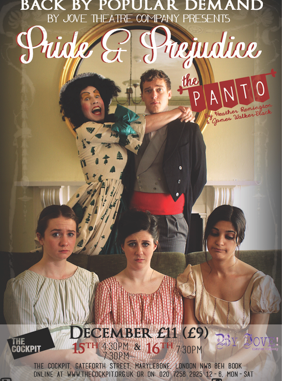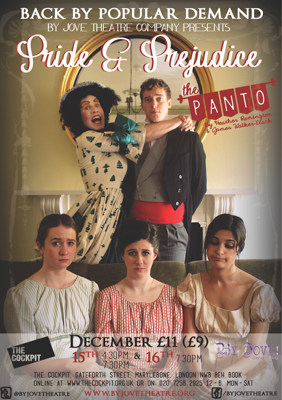
Genuine hilarity amongst the audience last night at the Cockpit Theatre in Marylebone where By Jove were performing Pride and Prejudice, the Panto. Not one for Janeite purists who only read the 1813 three-volume first edition, for everyone else this is a light-hearted romp through the well-loved book. Writers Heather Remington and James Walker-Black have spotted a story ripe for the pantomime treatment and in Mrs Bennet have created a perfect pantomime dame.
Unexpectedly the villain is Charles Dickens. He’s not in the original book, or at least not the versions I’ve read. Pride and Prejudice would have worked fine as a pantomime without Dickens’ presence, but he adds a new level of conflict as he competes with Daisy Jervis’ Fairy Austen to prove who writes the best books. Did Charles Dickens and Jane Austen really argue about who was best? It’s unlikely as Dickens was born in 1812 and Austen died in 1817, but go with it, in the hands of Alexander Woodward Dickens makes a suitable panto baddie. Ha-ha-ha-ha-ha-ha!
For those who don’t remember the plot of Pride and Prejudice, or, like me, confuse it with every other Jane Austen book, this is the one with Mrs Bennett trying to marry off her daughters. She’s so obsessed by the idea that the girls dare not mention the word marriage, in case it brings their mother galloping into the room to ask who is getting hitched.

The book has more Bennet sisters than a pantomime needs, so a master-stroke of casting was to make Lydia and Kitty sock puppets. They increase the workload for Chloe Wilcox who plays Mary, as she also has another sister on each hand. She plays all three characters deftly, different accents and attitudes helping to distinguish them. The role of Mr Bingley has also been subject to an unusual casting decision. I won’t question the literary analysis that has driven his portrayal, but it’s fair to say it’s a niche interpretation of the text.
In the book Mr Bennet remarks to his daughter Mary ,’You have entertained us long enough,’ in an attempt to get her to stop singing. Here Mary’s lack of musical ability is a running gag, with her trying to sneak up to the piano or break into song and her mother desperately preventing her. On stage Mr Bennet is strangely lacking from the family, but it’s hard to miss him when the cast are blasting out song and dance numbers such as a Regency version of Madness’ Our House with the chorus lyric: ‘Our house…in the middle of our grounds.’
Anachronisms are held high – the Bennets watch Strictly Come Dancing and Nigella is referenced. There is plenty of breaking the fourth wall, talking to the production crew and arguing about what’s happening on stage. The set includes projections of black and white drawings in a modern cartoon style which give the locations a contemporary feel and there are clever design touches, as when a moving carriage is summoned up with a couple of rotating umbrellas.
Co-writer James Walker-Black plays the loud, brash Mrs Bennet with exuberance, ad-libbing freely. With a capacious mono-bosomed costume and a beehive hairdo he chides the audience in what is surely an exhausting performance. Director David Bullen gives us a slimy Mr Collins whilst SJ Brady playing feisty Elizabeth squirms away from him – before performing a particularly memorable piece on an imaginary pianoforte. Joe Feeney is an impeccably sullen Darcy, whose wet T-shirt scene from the BBC series is milked just far enough.
The action keeps moving, with digressions into game shows, Colin Firth spoofs and pop music parodies. If you know anything of Jane Austen’s characters – ie, you are alive and grew up in England – then this production is ideal for avoiding the usual panto suspects and having an evening full of literary laughs. Pride and Prejudice, the Panto deserves a more extended run – hopefully next year it’ll be back for longer. I recommend going to see it. After all, where else can you boo Charles Dickens?

Leave a Reply